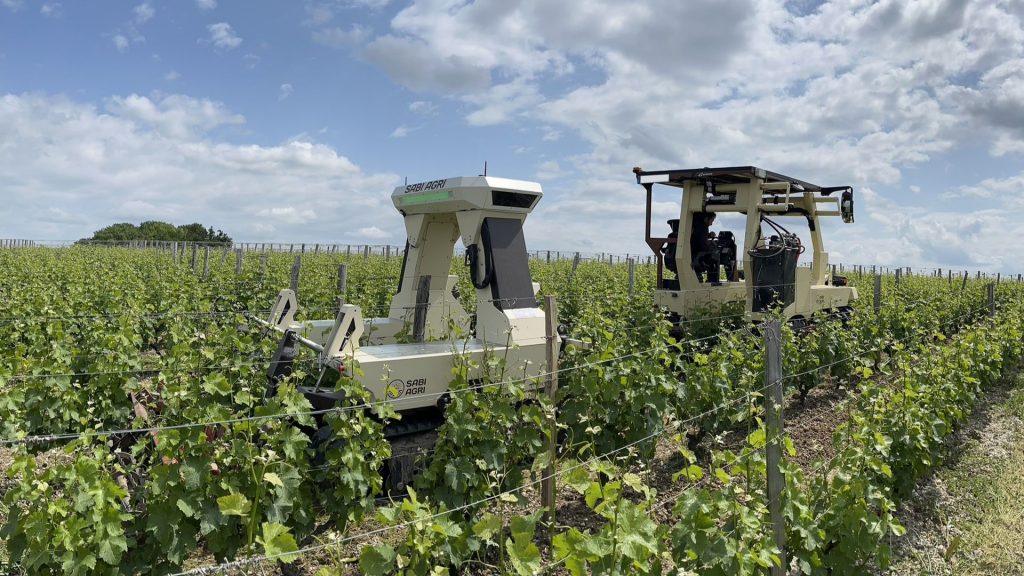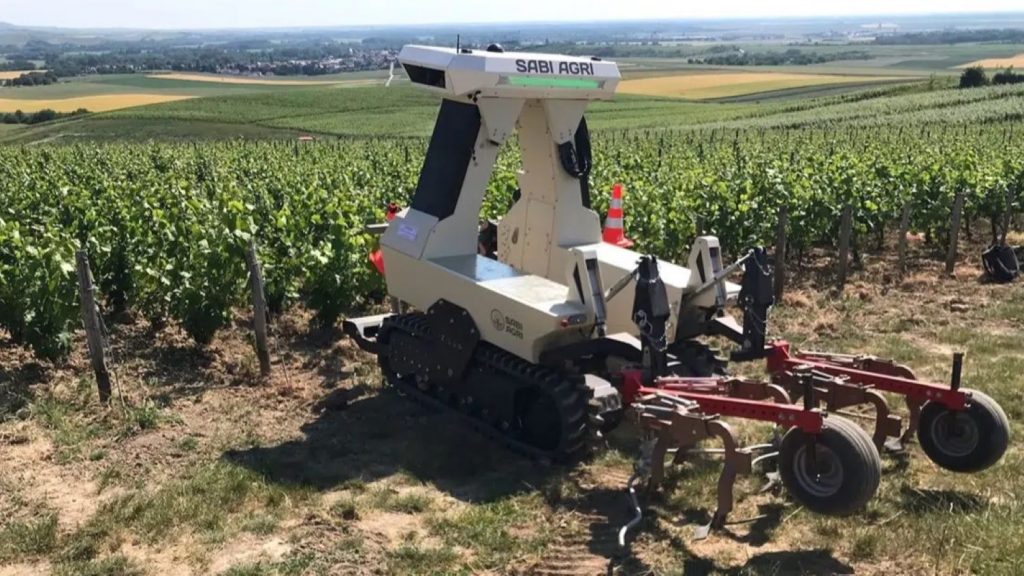
At the SITEVI trade fair this week in Montpellier, France, for the wine grape-, fruit-, and olive-growing sectors, SABI AGRI presented its Robotic Harmony, what it calls the first 100% electric collaborative agricultural fleet. The company won an event silver medal for the technology, consisting of an Alpo electric straddle tractor and a Zilus all-terrain robot introduced this summer.
Aboard the Alpo electric tractor, a winegrower can work a vineyard and pilot the Zilus all-terrain robot, which carries out the same or complementary operations. From tillage to harvesting, via disease detection, the company says that the multiplicity of robots that exist today makes it possible to automate a crop cycle while keeping farmers at the center of the process to give them time for higher-value-added activities.
The startup, co-founded by Managing Director Laure and President Alexandre Prévault-Osmani and recognized by the French Tech 2030 Mission, aims to make agriculture more sustainable with robust, high-performance electric tractors and robots dedicated to the implementation of environmentally friendly practices. In September 2022, it announced an €8 million Series A financing round, from existing investors Ui Investissement and Crédit Agricole Centre France and new investor Cita Investissement, which it said would enable the family business to continue with its ambitious development strategy of transforming its electric into autonomous tractors.
“Agricultural robotics is a lever capable of providing virtuous solutions,” said Laure, at the time. “With more than 15,000 hours of field feedback, we are ready to deploy the next generation of versatile and collaborative robots to facilitate the implementation of sustainable, profitable, and respectful agriculture.”
In the fast-growing agtech market, SABI AGRI says it has made electricity a design asset, and its electric tractors are natively “robotizable.”
“Turning our electric tractors into robots is just a matter of replacing the driver with an algorithm,” said Alexandre. “Everything in our machines allows this transition.”
At SITEVI, that transition was on full display when Laure participated in a round-table discussion on “robotizing the entire crop circle.” It was supported in September when the company participated in the launch of the Grand Défi Robotique Agricole to highlight the Robotic Harmony fleet. Announced by French organizations Ministry of Agriculture and Food Sovereignty, in partnership with INRAE, the National Research Institute for Agriculture, Food and the Environment, and the RobAgri association, the state investment plan of €21 million over five years aims to enable the establishment, development, and marketing of robotic agroecological solutions to encourage farmers to adopt new technologies.

“We are proud to be an actor of the Grand Défi Robotique Agricole, which aims to accelerate the development of robotics for agriculture,” said Laure. “We are fully committed to this transition and share the sector’s development objectives to support farmers towards a more sustainable agriculture.”
What made Robotic Harmany possible is the addition to the company’s line with Zilus, what it calls the most powerful wine-growing robot on the market. It uses “caterpillar” tracks and an all-steel mechatronic architecture to make it robust for agricultural work. It has an electric runtime of 8-10 h with a 2-h recharge time.
“Our robotics are designed for use in the field, making them easy and ergonomic to use,” said Alexandre. “Coming from the farming world, we understand the uses and expectations of farmers. The robot has to be a real day-to-day companion.”
The company says that the Zilus is the only robot to offer so much modularity and four driving modes. It can work in total autonomy thanks to centimeter-level RTK GPS, be driven via remote control or directly from a driver station, and crucially work in Robotic Harmony with the company’s Alpo electric tractor. With Robotic Harmony, there’s no need for cartographic reconnaissance or prior surveying of the plot.
Based on a modular design shared with the Alpo, the Zilus has the same motors, battery packs, and interfaces, “which was proven, and made completely autonomous,” said Alexandre. An adaptable height and width mean it can perform cultivation operations and work on inclines and slopes of up to 55%.
The robot can straddle narrow vines and pass through the inter-row for wide vines, aided by a straddle height of 205 cm and a minimum overall width of 150 cm for working between the rows. It has three work zones, with front, central, and rear tool carriers, for versatility, and is compatible with standard mechanical, hydraulic, and electric tools.
In May, the first French partners received their Zilus models in Sauternes and Champagne.

